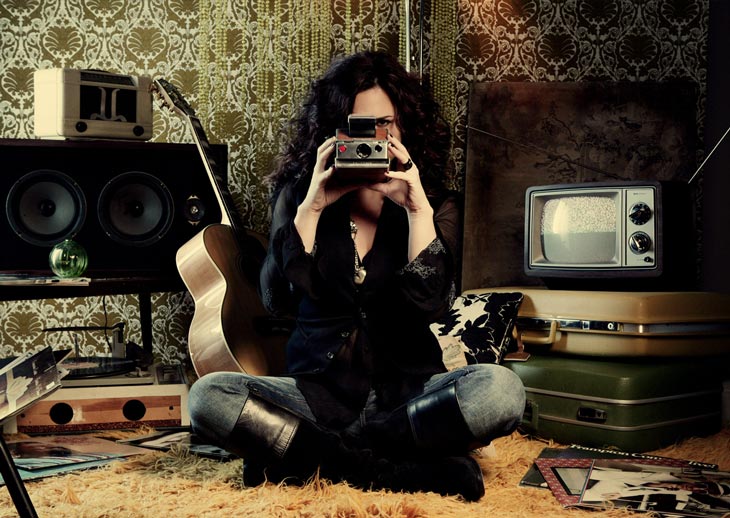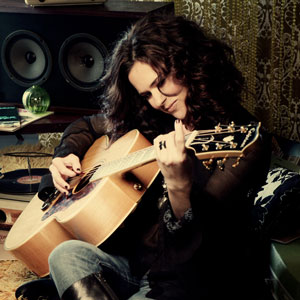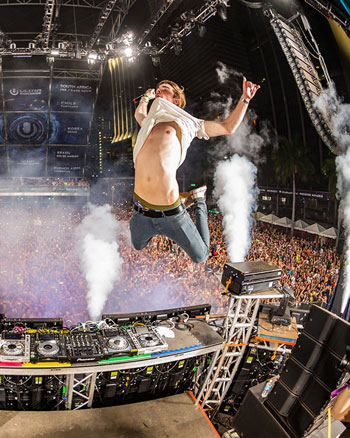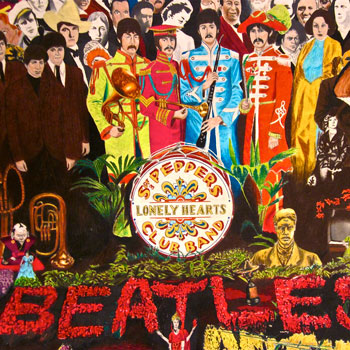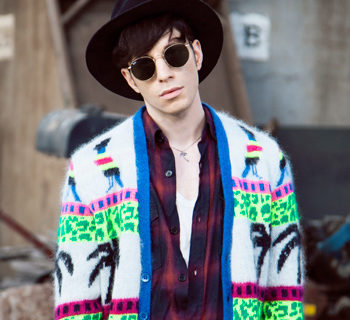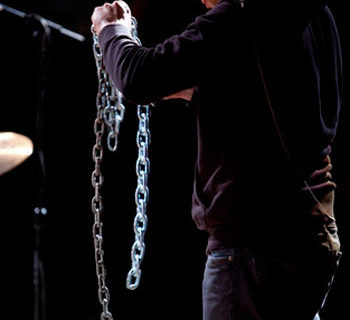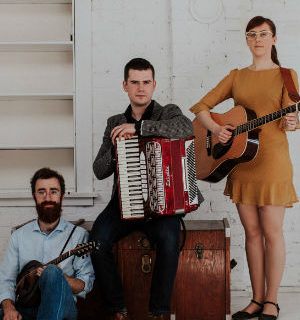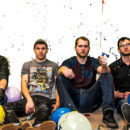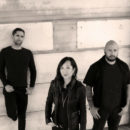Shelly Fairchild Talks Nashville
Nashville Tennessee knows how to make Country Music. The pure craftsmanship of the radio friendly three and a half minute songs is something to marvel at. Almost every song has a hummable melody, a hook that gets deeply embedded into the existence of the listener and a story that typically touches on the human condition.
Shelly Fairchild, a long time veteran of the Nashville scene brings the thunder. Her 2005 Columbia recording debut Ride lit up the country charts with a Billboard Hot Country Songs top 40 hit "You Don't Lie Here Anymore." Her sophomore effort, Ruby’s Money, displayed more of the vocal chops and lyrical dexterity that showcased her first album.
That she has continued to grow as a performer, a studio musician and as a backing vocalist for Martina McBride is testament of her ability as a journeyman player in the big leagues of Nashville. She has sung on Jason Aldean's No. 1 single, "Burnin' It Down" and the Top 10 Eric Church hit, “Creepin.” As well as other tracks by Trace Adkins, Terri Clark, and Tanya Tucker. Oh, and she did a little jam in a club with Steven Tyler of Aerosmith that brought down the house.
Her new album is currently in production in through Pledge Music.
How’s the album coming?
Shelly: The album is coming. It had a start and a stop twice now and this is the third start. So we have to be cautiously optimistic at the moment. We’ve just been through a few producers and trying to peg the right sound. It’s really important that this record be, like I said in the last update or last two updates ago, that it has to be what it has to be. I’m kinda nervous about it you know.
Yeah. You’ve got big shoes to fill when you compare anything next to Ride.
Shelly: Awww. It’s so funny that it has been 10 years!
Ten years, yeah.
Shelly: I mean I’ve made a couple. Like a made an EP in 2007, but it was basically like a songwriting pitch. My last record was a full-horn band record called “Ruby’s Money”. I don’t know if you had a chance to look at that, but it’s totally cool and different—not country.
On this record, I just wanted to sing songs that I want to listen to forever. I feel like “Ruby’s Money” there are some songs that I can go back and listen to, but a lot of it was just having a great time. We were performing it live and you can tell, with all the horns and everything that is hard to bring on the road, especially if you’re an independent artist. So I got to do a lot of local and regional shows, but that was it.
For this record, I’ve been working really hard on my songwriting, and with that being said I’ve also for the first time have reached out to other publishers in town for songs that other people have written. I know the plethora of music and the talent, it is like children that are totally discarded.
So you just go and find the ones that have been sitting on the shelf that are still really good?
Shelly: There used to be people hired at publishing companies just to the back catalog archives from the ′70s and stuff like that, just gems that nobody’s going to hear unless you go through them. That’s what we’re digging in and trying to find, old Dennis Linde songs, Emmy Lou Harris, whatever.
That’s something that I’ve always noticed about the Nashville songwriting, the songs are always top of the line. They’ve got hooks, the production is just sparkling, and the story holds up. That is evident on the album Ride. It’s textbook Nashville. Who produced that record?
Shelly: My management and I had this idea that we kinda wanted to marry a traditional country producer with someone who leaned toward more rock, a guitar player or something like that. So we reached out to Buddy Cannon, who does Kenny Chesney, Willie Nelson, and has done some Alison Krauss records, Haggard and stuff. Buddy Cannon was our first choice for the country side, then for more of the rock blues side we went with Kenny Greenberg. In the first meeting Buddy brought me “Muddy Water” and “Fall” and I think one more song that made it onto that record. And I brought him “I Want to Love You,” “Tiny Town,” and “You Don’t Lie Here Anymore.” We just had a direction right away.
So is their first inclination always to use a really, really good song versus the artist’s song?
Shelly: I think it’s just different per artist. Like Chris Stapleton, if you know him, he’s a new artist who’s nominated for like a million awards for CMA and stuff. He is a stone cold country singer, but he also has some blues influences and soul influences. Somebody like that, he just does what he does. He’s a guy who sits around and writes his songs. But then you got me, I do that, but I’m not tied to that.
It seems like a great honor if you have some of your own tunes on the album.
Shelly: It’s a goal to at least have half of the songs. Certainly I am writing great enough songs that will make the cut. But you never know. Honestly, I’m not good at producing myself, so it always helps to have that other voice in there. That’s kind of where we are at right now—trying to nail that down.
Is it difficult when you are not on a major label to get producers that are good?
Shelly: It is difficult to get who you want, if who you want is making records on major label acts. It’s a budget thing.
I’m interested in your back-up singing gig with Martina McBride, and some of the other records you’ve done. Is Martina the first person you’ve been on the road with as far as back-up?
Shelly: No. Actually when I first moved into town, I moved here in ′96 for the first time, and I sang back ground with a Christian artist Jaci Velasquez. She was the first one I sang background for, then I went on the road with an independent artist named Celia. I sang for her and did some dates with Jason Aldean and Tanya Tucker, but not long tours like this.
Which bus do you travel in? Do they have a band bus, a Martina bus, then a singer bus?
Shelly: We have three buses on the road. Martina has her own with her family. The crew has its own bus.
How many gigs do you guys do in a week?
Shelly: This summer we did the longest run that Martina has ever done. It was a six week run. Other than that, we are weekend warriors. Like today I leave at 6 o’clock, but usually we leave Wednesday night at midnight, but today we leave a little earlier because we’re going to New Hampshire, and we got a long drive.
When you joined Martina’s band, was it already established as far as the parts that you’re going to sing by the other singers? Because there were other singers before you right?
Shelly: Yes and no. When she went into record, she made this album“Everlasting” with Don Was producing and they did a great job. They hired, one of the girls that’s on the road with us, Wendy Moten who had a big hit in the ′90s called “Coming Out of the Rain,” she’s unbelievable. But she also sang with Julio Iglesias for 15 years and Faith Hill, you name it. She’s on all the records of these great singers. But Wendy was hired as one of the background vocalists, along with Vicki Hampton, and I think Andrea Merritt. Andrea sang with Michael McDonald full time and Vicki sings with Garth Brooks and Dolly Parton. The only one that could do the tour was Wendy. So they hired me and the other girl Chandra Pennix to go out on the road.
Some of the parts were already established, but then a lot of the things we added, the three part harmony to some of her hits. Some of them had a one part or two part harmony, but then we added the low so we could fill it out.
So did they let you do that and figure out some of those yourself?
Shelly: Yeah. We had a pretty extensive rehearsal to prepare for because we do everything. We were in rehearsals for four weeks. Any time we added parts to some of the older songs, it was run through by Martina. Martina is pretty open, and very musical, so she would come over to us if she had a question or something like “Hey this is kind of rubbing here” or “You’re kinda on my part here, and I love that, but on this part could you please not be on my part?”
Do you every think about background versus having your own show?
Shelly: Yeah. You know I started in musical theater. I started as a singer. I sang in church and barbeques around my town and the zoo.
The zoo?
Shelly: Yeah the zoo. For the animals really.
So, that’s how I started, but once I got into high school I did theater. And in college I did theater. Then I started working in professional theater. I did Patsy Cline and a show called Beehive, it was a ′60s musical. I also did some normal shows like Westside Story and Grease. But with the period pieces, I had to sort of mimic Grace Slick and Connie Francis and Brenda Lee. I have such fond memories of that and a real nostalgia of that, because I love the theater, I love the vocal parts, I love the voice, I love how it can be amazing with harmonies. My dad was always doing harmonies, and it was always so beautiful to me. So it’s something that touches my soul
Are you getting calls from producers there in Nashville to do background vocals?
Shelly: Yeah. I’ve done the background singing on a couple of #1 hits. I was with Eric Church on “Creepin” and Jason Aldean’s “Burning it Down,” and I’ve been on Terri Clark’s record. And some other new acts like Thomas Rhett and Tyler Farr.
When they call you into the studio, what are some other skills that are important to have? Just being able to pick it up really fast?
Shelly: Well you’ve got to be able to mimic, but it depends on what they want. If they want you to stand or adlib a little more, you just have to be bold enough. You have to be musical enough to know where to go. I always think of Dolly Parton, because sometimes she picks the craziest parts as a background singer. She doesn’t just sing the third or the fifth. She’ll sort sing around it and make it her own thing. Emmy Lou Harris is sort of the same way.
On “Burnin’ It Down” he wanted sort of a ghost part an octave above Jason Aldean. So when you listen to it, it’s kind of like “Dang it’s hard to hear me a little bit.” But you can hear me. You have to mimic kind of the singer you’re singing with a lot of the time. Like when we sing on the more soulful stuff like “Come See about Me” or “Do Right Woman, Do Right Man” or “In the Basement,” you have to power through those songs with a little more soul than you do on “Independence Day” or “Broken Wing.”
And being able to nail it a timely manner?
Shelly: Right. They don’t want to pay you to be there for three hours if you’re really skilled. Like Wendy Moten or Vicki Hampton could sing it in 30 minutes, sign the card and get out of there. It goes to the Musician’s Union. You’re timed out. Usually they like to give you a full hour. They don’t want you to be paid just for 20 minutes.
How did the YouTube video with Steven Tyler come about? It’s pretty epic.
Shelly: Well my friend, Richie Supa, is one of his best friends. Richie wrote for several songs for Aerosmith back in the day. He wrote the song that we recorded and Steven did it. We practiced in his hotel room and he would come down. He was just as normal as pie. He came over at my mic at one point and had my eyes closed, I couldn’t even. I don’t know. He’s just phenomenal really!
Well it looks like you have a great musical career. You’ve got studio gigs and back up singing road gigs. And you’ve got your own gig, your own show.
Shelly: When I talk about it, I see how well rounded and I’m always grateful. But I do get down when I don’t think I’m so-called successful. When I talk about, I am able to see it fall out of my mouth— “you work and you live music.”
What’s the name of the record?
Shelly: I don’t have a name yet! I wish I could tell you who the producer was and stuff, because that would be such meaty information. It’s not picked yet and I don’t want to throw out information that is just poop information.
Right. So when it is done are you going to book shows behind it then?
Shelly: Yes. My whole goal in life is to make music and go play it. What I do best is live. That is my whole goal my whole life since I was little. What I hope for with my music is that people will just find it, love it and want to share it. If you’re a fan you’re like my family. It’s like we are a family getting together for a family reunion.

